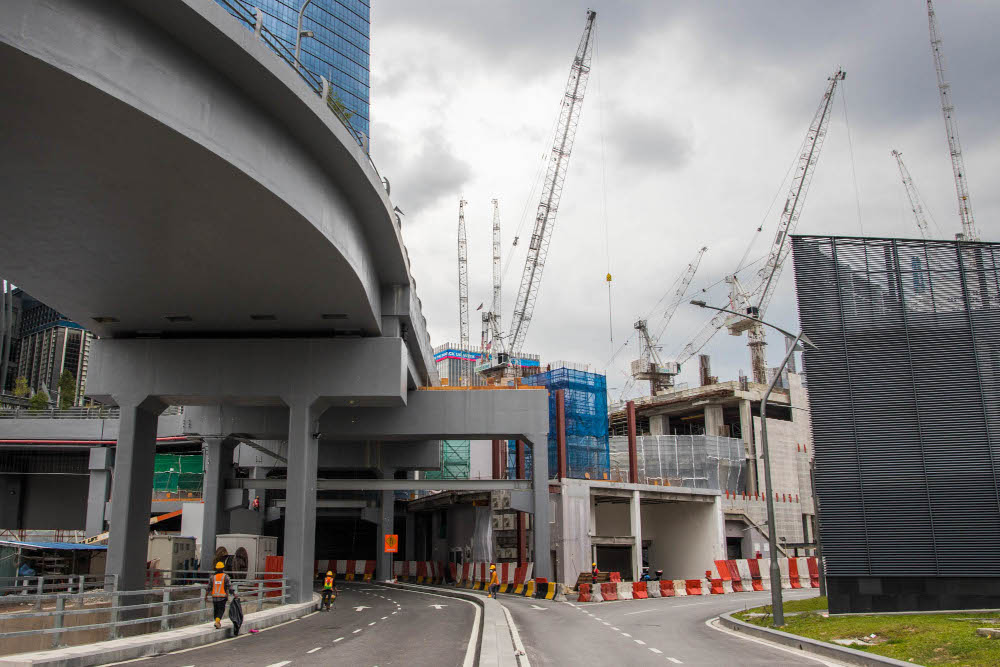Cranes and material stand at a construction site near the Tun Razak Exchange (TRX) financial district in Kuala Lumpur, October 28, 2021. — Picture by Firdaus Latif
KUALA LUMPUR, Oct 31 — Malaysia is facing a labour crunch in key economic sectors like factories and construction even as the country eases up on Covid-19 movement restrictions that should allow workers greater mobility to go to work.
According to The Straits Times, the shortage is attributed in part to the soon-to-expire work permits of foreigners who form a substantial number of employees in these critical sectors, and in part to problems hiring and retaining locals even with the current high unemployment rate in the country that has been exacerbated by the pandemic.
Textile factory owner Wan Imran Alim said he has not had luck in retaining Malaysians who were hired.
“They come and go and don’t seem serious enough to keep the job despite the pandemic leaving thousands unemployed,” Wan Imran was quoted as saying.
National Chamber of Commerce and Industry of Malaysia president Low Kian Chuan told the Singapore newspaper that the number of migrant workers in the country is now down to 1.1 million from 1.9 million in 2018.
Human Resources Minister Datuk Seri M. Saravanan had in June 2020 said there would be a freeze on new intake of foreign workers until the end of 2020 to reduce their numbers in the workforce and to give Malaysians priority in securing jobs.
The suspension has been extended to the end of 2021.
According to the Department of Statistics, Malaysia’s unemployment rate as of August is at 4.6 per cent. That means 748,800 people in the country are unemployed.
In comparison, the unemployment rate during the pandemic peaked in May last year at 5.3 per cent or 826,100 people.
The government has addressed this issue in Budget 2022, which was tabled in Parliament last Friday. The government plans to allocate RM4.8 billion for the Malaysian Family Job Guarantee initiative or JaminKerja which will guarantee 600,000 job opportunities for locals.
Malaysian Employers Federation president Syed Hussain Syed Husman said the federation supports the government’s efforts to reduce reliance on foreign workers in certain sectors.
He also urged the government to address this on a wider sectoral level as many sectors apart from plantation and construction depend on such migrant labour.
“The unskilled and lower-skilled jobs in the manufacturing and restaurants operations are not attractive to the locals even though the salary package is good. It’s more to do with the social status of such jobs and the environment of such workplaces,” Syed Hussain was quoted saying by ST.
However, the Malaysian Trades Union Congress (MTUC) deputy president Mohd Effendy Abdul Ghani disagreed that locals are too choosy about their job at this time.
He told ST that many Malaysians are willing to take up any job, including those classed as 3D — dirty, dangerous, difficult — or those that have nothing to do with their academic qualification.
“But if the environment is not conducive and they have to survive on a minimum wage of RM1,200 to RM1,500 in the coming 10 years… that isn’t fair, especially when many are overqualified for the job,” Mohd Effendy was quoted saying.
Two Malaysians who left their jobs in the construction and manufacturing sectors just several months after being hired supported the MTUC view.
Aditya Akasha, 27, said he left construction because his ex-employer cut RM300 from his salary instead of giving aid after he contracted Covid-19 at work.
Ram Singh, 25, said he was aware when he was hired to work in the 3D sector that it wouldn’t be glamorous but accepted anyway. He said he left his job as a quality control inspector mainly due to the treatment from the employer.
He is now working in a restaurant as a server, ST reported.

